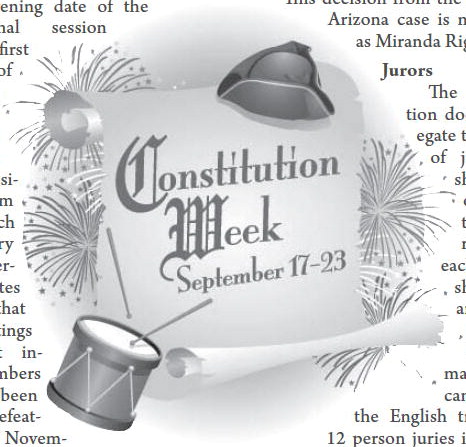DAR Celebrates Constitution Week


mrandolphadvance@gmail.com
The Daughters of the American Revolution (DAR) is celebrating the annual Constitution Week on September 17-23; the local chapter has shared some facts about the document and its contents in recognition of this holiday.
The idea for this Week came from DAR President General Gertrude S. Carraway, who adopted a project in 1955 to promote the observance of the U.S. Constitution with a memorial week beginning on September 17, the anniversary of the date the document was signed. This project served to encourage DAR chapters and members to study, teach, and discuss the U.S. Constitution, and to invite their governors and mayors to issue proclamations celebrating the historic document.
Constitution Week became an official holiday on August 2, 1956, when President Dwight D. Eisenhower adhered to a proposal that the national DAR sent through Senator William F. Knowland of California.
Facts
As a celebration of this foundation of our nation, the local chapter of the DAR has shared some interesting facts about the contents and history of the Constitution to share with the public.
Voting D.C. Electoral Votes Residents of the District of Columbia (Washington, D.C.) may vote in the presidential election because of the 23rd Amendment, which was ratified in 1961. The District’s presidential votes are equivalent to the number of electoral votes of the least populous state, which is Wyoming, according to the 2020 census; thus, D.C. may cast 3 electoral votes. These residents may also vote for a nonvoting delegate in the United States House of Representatives.
Voting Age
The voting age was lowered to 18 years old through the enacting of the 26th Amendment in 1971. This decision was brought about by the unpopular military draft for the Vietnam War, which caused a public outcry for the voting age to change. These individuals felt that if men of ages 18 through 21 were qualified to fight for their country, they should be able to vote for leaders who made decisions about war and peace.
Women’s Suffrage
The decision of whether or not women could vote is not directly addressed in the Constitution, leaving it to be determined by the state governments. Many of the western states were allowing their female citizens to vote prior to the adoption of the 19th Amendment in 1920, which is how former U.S. Representative Jeannette Rankin was elected to represent Montana in Congress in 1916.
“Lame Duck” Amendment
The “Lame Duck” Amendment, also known as the 20th Amendment, altered the second session of Congress by moving the opening date of the Congressional session from the first Monday of December to January 3, and the beginning of the presidential term from March 4 to January 20. This alteration of dates ensured that most meetings would not include members who had been retired or defeated during November elections, though sometimes these late sessions are still held for short periods to address unfinished business.
Candidates and Religion
Article IV of the Constitution forbids the requirement of election candidates to complete any “religious test” as a qualification for any office or public trust. Candidates are not required to share their religious affiliation or standing to the public; nor do they have to practice or pledge allegiance to any religion in order to hold office.
Court and Judicial System Provision of Attorneys Originally, the 6th Amendment required all criminal prosecutions to have a “speedy and public trial, by an impartial jury” as well as “compulsory process for obtaining witnesses in his favor, and to have Assistance of Counsel for his defense.” The Supreme Court upheld this provision for federal court trials in 1938 but did not extend the provision to state trials until Gideon v. Wainwright in 1963, which decided that those accused of serious crimes in state courts may be offered an attorney if unable to afford one. Argersinger v. Hamlin extended this right to misdemeanor offenses within state courts in 1972. 5th Amendment in the Courtroom
The 5th Amendment protects those accused of a crime from self-incrimination through speech prior to trial, but not during trial. In 1966, the Supreme Court ruled that this safeguard is not designed for use in the courtroom, but rather that police must inform suspects that they have the right to remain silent, that their statements may be used against them, and that they have the right to an attorney’s presence during questioning before proceeding with interrogation.
This decision from the Miranda v. Arizona case is now known as Miranda Rights.
Jurors
The Constitution does not delegate the number of jurors that should be on each trial, but rather that each case should have an impartial jury. The twelve man jury came from the English tradition of 12 person juries in England, but the Supreme Court has since ruled that a jury’s size could vary according to the seriousness of a crime.
Supreme Court Justice Terms
The Constitution only dictates that Supreme Court justices “shall hold their offices during good behavior,” and does not give a specific amount of time. Thus, justices have the ability to serve on the Supreme Court for the rest of their lives or until they choose to retire.
The only way for a Supreme Court Justice to be removed is by impeachment through the House of Representatives and conviction in the Senate. This impeachment is rare, and often does not end in removal because of lack of conviction by the Senate. For example, Justice Samuel Chase was impeached by the House of Representatives for “arbitrary, oppressive, and unjust” behavior on the bench in 1803; yet, the Senate did not convict him of the crime, and he served on the Supreme Court until his death in 1811.
Congressional Powers Constitutional Amendments Amendments to the Constitution become valid after receiving twothirds vote of each house of Congress and three-fourths vote by the states. States can ratify an amendment by a vote of their individual legislatures or by electing special conventions, as they did in 1933 to repeal the 18th Amendment (Prohibition) by enacting the 21st Amendment.
Filibusters
The Constitution allows each house of Congress to set its own rules of proceedings, which has allowed the Senate to accept the utilization of filibusters, but not the House of Representatives. The House of Representatives limits how long members may speak and reduces the ability to block legislation because of the representation by population that the group represents. Meanwhile, the Senate is designed to give the minorities a greater voice, which can prevent the holding of a vote where the majorities would prevail. These filibusters, that are basically unlimited debates, take threefifths of the senate vote to end.
Other Provisions “All Men Are Created Equal” Though commonly referred to as a part of the Constitution, the phrase “all men are created equal” comes from the Preamble to the Declaration of Independence. The preamble to the Constitution makes no assertion of equality within people but does define government’s purpose as being to maintain peace at home, provide national defense, promote the well-being of the people, and protect the people’ liberties.
State of the Union
The Constitution requires the president to give the Congress information on the state of the union “from time to time.” Though traditionally presented in person, this address may be presented in written form, if necessary, as Thomas Jefferson and John Adams did during their presidencies. The public, in-person address tradition was later revived in 1913 by President Woodrow Wilson.
Patent Protection
Through the Constitution, Congress has the right to establish copyright laws and provide patent protection for inventors and authors. This is done through the promotion of the “Progress of Science and useful Arts, by securing for limited Times to Authors and Inventors the exclusive Right to their respective Writings and Discoveries,” which is depicted in Article I, Section 8 of the document. Patents are available to new inventions and inventions that perfect existing items.
Purchase of Territory
The Constitution does not address purchasing new territories, but does give the president the right to make treaties through the two-thirds approval vote of the Senate. Thus, these purchases occur through the form of treaties.





